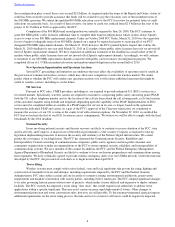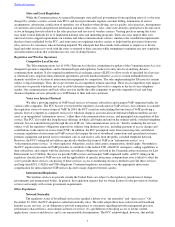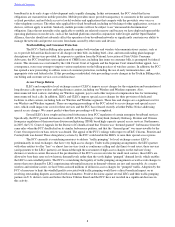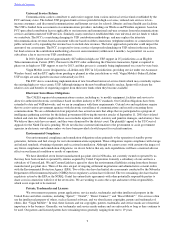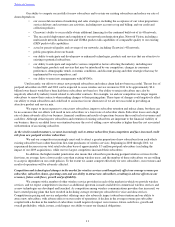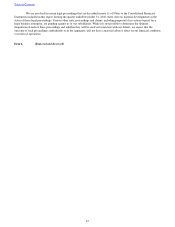Sprint - Nextel 2010 Annual Report Download - page 18
Download and view the complete annual report
Please find page 18 of the 2010 Sprint - Nextel annual report below. You can navigate through the pages in the report by either clicking on the pages listed below, or by using the keyword search tool below to find specific information within the annual report.
For example, we obtain some of our CDMA handsets from HTC Corp. Apple Inc. has filed an action with the
International Trade Commission (ITC) and with U.S District Courts accusing HTC of patent infringement. HTC has filed an
action against Apple with the ITC accusing Apple of infringing HTC patents. Apple's claims against HTC, if successful, could
require us to cease providing certain products.
Government regulation could adversely affect our prospects and results of operations; the FCC and state regulatory
commissions may adopt new regulations or take other actions that could adversely affect our business prospects, future
growth or results of operations.
The FCC and other federal, state and local, as well as international, governmental authorities have jurisdiction over
our business and could adopt regulations or take other actions that would adversely affect our business prospects or results of
operations.
The licensing, construction, operation, sale and interconnection arrangements of wireless telecommunications
systems are regulated by the FCC and, depending on the jurisdiction, international, state and local regulatory agencies. In
particular, the FCC imposes significant regulation on licensees of wireless spectrum with respect to how radio spectrum is used
by licensees, the nature of the services that licensees may offer and how the services may be offered, and resolution of issues of
interference between spectrum bands.
The FCC grants wireless licenses for terms of generally ten years that are subject to renewal and revocation. There is
no guarantee that our licenses will be renewed. Failure to comply with FCC requirements in a given license area could result in
revocation of the license for that license area.
Depending on their outcome, the FCC's proceedings regarding regulation of special access rates could affect the rates
paid by our Wireless and Wireline segments for special access services in the future. Similarly, depending on their outcome, the
FCC's proceedings on the regulatory classification of VoIP services could affect the intercarrier compensation rates and the
level of USF contributions paid by us.
Various states are considering regulations over terms and conditions of service, including certain billing practices and
consumer-related issues that may not be pre-empted by federal law. If imposed, these regulations could make it more difficult
and expensive to implement national sales and marketing programs and could increase the costs of our wireless operations.
Degradation in network performance caused by compliance with government regulation, loss of spectrum or
additional rules associated with the use of spectrum in any market could result in an inability to attract new subscribers or
higher subscriber churn in that market, which could adversely affect our revenues and results of operations. In addition,
additional costs or fees imposed by governmental regulation could adversely affect our revenues, future growth and results of
operations.
Proposed regulatory developments regarding the use of “conflict” minerals mined from the Democratic Republic of
Congo and adjoining countries could affect the sourcing and availability of minerals used in the manufacture of certain
products, including handsets. Although we do not buy raw materials, manufacture, or produce any electronic equipment
directly, the proposed regulation may affect some of our suppliers. As a result, there may only be a limited pool of suppliers
who provide conflict free metals, and we cannot assure you that we will be able to obtain products in sufficient quantities or at
competitive prices. Also, because our supply chain is complex, we may face reputational challenges with our customers and
other stakeholders if we are unable to sufficiently verify the origins for all metals used in the products that we sell.
If our business partners and subscribers fail to meet their contractual obligations it could negatively affect our results of
operations.
The current economic environment has made it difficult for businesses and consumers to obtain credit, which could
cause our suppliers, distributors and subscribers to have problems meeting their contractual obligations with us. If our suppliers
are unable to fulfill our orders or meet their contractual obligations with us, we may not have the services or devices available
to meet the needs of our current and future subscribers, which could cause us to lose current and potential subscribers to other
carriers. In addition, if our distributors are unable to stay in business, we could lose distribution points, which could negatively
affect our business and results of operations. Finally, if our subscribers are unable to pay their bills or potential subscribers feel
they are unable to take on additional financial obligations, they may be forced to forgo our services, which could negatively
affect our results of operations.
Our business could be negatively impacted by security threats and other disruptions.
Major equipment failures, natural disasters, including severe weather, terrorist acts, cyber attacks or other breaches
of network or information technology security that affect our wireline and wireless networks, including transport facilities,
communications switches, routers, microwave links, cell sites or other equipment or third-party owned local and long-distance
networks on which we rely, could have a material adverse effect on our operations. These events could disrupt our operations,
require significant resources, result in a loss of subscribers or impair our ability to attract new subscribers, which in turn could
have a material adverse effect on our business, results of operations and financial condition.
Table of Contents
16


